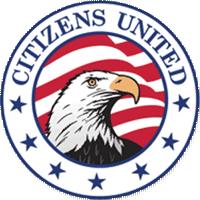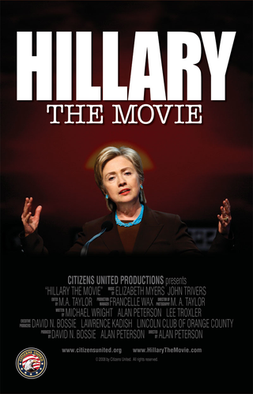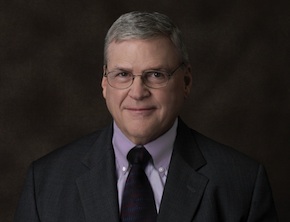Campaign finance laws in the United States have been a contentious political issue since the early days of the union. The most recent major federal law affecting campaign finance was the Bipartisan Campaign Reform Act (BCRA) of 2002, also known as "McCain-Feingold". Key provisions of the law prohibited unregulated contributions to national political parties and limited the use of corporate and union money to fund ads discussing political issues within 60 days of a general election or 30 days of a primary election; However, provisions of BCRA limiting corporate and union expenditures for issue advertising were overturned by the Supreme Court in Federal Election Commission v. Wisconsin Right to Life.
Corporate personhood or juridical personality is the legal notion that a juridical person such as a corporation, separately from its associated human beings, has at least some of the legal rights and responsibilities enjoyed by natural persons. In most countries, a corporation has the same rights as a natural person to hold property, enter into contracts, and to sue or be sued.

Citizens United is a conservative 501(c)(4) nonprofit organization in the United States founded in 1988. In 2010, the organization won a U.S. Supreme Court case known as Citizens United v. FEC, which struck down as unconstitutional a federal law prohibiting corporations and unions from making expenditures in connection with federal elections. The organization's president and chairman is David Bossie.
Buckley v. Valeo, 424 U.S. 1 (1976), was a landmark decision of the US Supreme Court on campaign finance. A majority of justices held that, as provided by section 608 of the Federal Election Campaign Act of 1971, limits on election expenditures are unconstitutional. In a per curiam opinion, they ruled that expenditure limits contravene the First Amendment provision on freedom of speech because a restriction on spending for political communication necessarily reduces the quantity of expression. It limited disclosure provisions and limited the Federal Election Commission's power. Justice Byron White dissented in part and wrote that Congress had legitimately recognized unlimited election spending "as a mortal danger against which effective preventive and curative steps must be taken".
The Federal Election Campaign Act of 1971 is the primary United States federal law regulating political campaign fundraising and spending. The law originally focused on creating limits for campaign spending on communication media, adding additional penalties to the criminal code for election law violations, and imposing disclosure requirements for federal political campaigns. The Act was signed into law by President Richard Nixon on February 7, 1972.
McConnell v. Federal Election Commission, 540 U.S. 93 (2003), is a case in which the United States Supreme Court upheld the constitutionality of most of the Bipartisan Campaign Reform Act (BCRA), often referred to as the McCain–Feingold Act.
First National Bank of Boston v. Bellotti, 435 U.S. 765 (1978), is a U.S. constitutional law case which defined the free speech right of corporations for the first time. The United States Supreme Court held that corporations have a First Amendment right to make contributions to ballot initiative campaigns. The ruling came in response to a Massachusetts law that prohibited corporate donations in ballot initiatives unless the corporation's interests were directly involved.
United States v. Verdugo-Urquidez, 494 U.S. 259 (1990), was a United States Supreme Court decision that determined that Fourth Amendment protections do not apply to searches and seizures by United States agents of property owned by a nonresident alien in a foreign country.

The financing of electoral campaigns in the United States happens at the federal, state, and local levels by contributions from individuals, corporations, political action committees, and sometimes the government. Campaign spending has risen steadily at least since 1990. For example, a candidate who won an election to the House of Representatives in 1990 spent on average $407,600, while the winner in 2022 spent on average $2.79 million; in the Senate, average spending for winning candidates went from $3.87 million to $26.53 million.

The Rehnquist Court was the period in the history of the Supreme Court of the United States during which William Rehnquist served as Chief Justice. Rehnquist succeeded Warren Burger as Chief Justice after the latter's retirement, and Rehnquist held this position until his death in 2005, at which point John Roberts was nominated and confirmed as Rehnquist's replacement. The Rehnquist Court is generally considered to be more conservative than the preceding Burger Court, but not as conservative as the succeeding Roberts Court. According to Jeffrey Rosen, Rehnquist combined an amiable nature with great organizational skill, and he "led a Court that put the brakes on some of the excesses of the Earl Warren era while keeping pace with the sentiments of a majority of the country."
Citizens United v. Federal Election Commission, 558 U.S. 310 (2010), is a landmark decision of the Supreme Court of the United States regarding campaign finance laws and free speech under the First Amendment to the U.S. Constitution. The court held 5–4 that the freedom of speech clause of the First Amendment prohibits the government from restricting independent expenditures for political campaigns by corporations, nonprofit organizations, labor unions, and other associations.

Hillary: The Movie is a 2008 political documentary about United States Senator and presidential candidate Hillary Clinton. It was produced by the conservative non-profit organization Citizens United. The film was scheduled to be offered as video-on-demand on cable TV right before the Democratic primaries in January 2008, but would have been classified as "electioneering communication", which was made illegal under the Bipartisan Campaign Reform Act, by the Federal Election Commission. The producers went to U.S. District Court for the District of Columbia to get a declaration that they could show their movie and promotional ads for it despite BCRA. This case was titled Citizens United v. Federal Election Commission and its final decision at the U.S. Supreme Court resulted in a major change in campaign finance law.

Richard D. McLellan is a lawyer at McLellan Law Offices PLLC. He has served as Chairman of the Michigan Law Revision Commission since 1986. He argued on the side of the appellee in the United States Supreme Court case Austin v. Michigan Chamber of Commerce, 494 U.S. 652 (1990).

Move to Amend is a national, non-partisan, grassroots organization that seeks to blunt corporate power by amending the United States Constitution to end corporate personhood and state that money is not speech. The group was created in response to the 2010 Supreme Court ruling Citizens United v. Federal Election Commission, which held that corporations have a First Amendment right to make expenditures from their general treasuries supporting or opposing candidates for political office, arguing that the Court's decision disrupts the democratic process by granting disproportionate influence to the wealthy. Move to Amend advocates for the "We the People" Amendment, currently in Congress as H.J.Res. 48, to establish that constitutional rights are reserved for natural persons only and require the regulation and disclosure of spending in U.S. elections.
American Tradition Partnership, Inc. v. Bullock, 2011 MT 328, is a decision by the Montana Supreme Court ruling that the broad free speech protections given to corporations in Citizens United v. FEC do not apply to Montana's campaign finance laws. The United States Supreme Court reversed the Montana Supreme Court's decision in American Tradition Partnership, Inc. v. Bullock, 567, U.S. 516 (2012), in a short, per curiam opinion issued without oral argument. The court wrote only that the legal issue had already been precluded by Citizens United, and this case offered no new arguments and failed to distinguish that prior decision.

Moneyocracy is a 2012 documentary film about Citizens United v. Federal Election Commission, 558 U.S. 310 (2010),which was a landmark United States Supreme Court case in which the Court held that the First Amendment prohibited the government from restricting independent political expenditures by corporations and unions. The film explores how the Citizens United v. Federal Election Commission decision has dramatically changed the U.S. Campaign Finance Laws and lead to the most expensive Elections in the United States. The film describes the systemic corruption of the United States democracy and the consequences of that systemic corruption on the U.S. democracy and the electorate.
A campaign finance reform amendment refers to any proposed amendment to the United States Constitution to authorize greater restrictions on spending related to political speech, and to overturn Supreme Court rulings which have narrowed such laws under the First Amendment. Several amendments have been filed since Citizens United v. Federal Election Commission and the Occupy movement.
Colorado Republican Federal Campaign Committee v. FEC, 518 U.S. 604 (1996), was a case heard by the Supreme Court of the United States in which the Colorado Republican Party challenged the Federal Election Commission (FEC) as to whether the "Party Expenditure Provision" of the Federal Election Campaign Act of 1971 (FECA) violated the First Amendment right to free speech. This provision put a limit on the amount of money a national party could spend on a congressional candidate's campaign. The FEC argued that the Committee violated this provision when purchasing a radio advertisement that attacked the likely candidate of the Colorado Democratic Party. The court held that since the expenditures by the committee were made independently from a specific candidate, they did not violate the campaign contribution limitations established by the FECA, and were protected under the First Amendment.

FEC v. National Conservative PAC, 470 U.S. 480 (1985), was a decision by the Supreme Court of the United States striking down expenditure prohibitions of the Federal Election Campaign Act of 1971 (FECA), which regulates the fundraising and spending in political campaigns. The FECA is the primary law that places regulations on campaign financing by limiting the amount that may be contributed. The Act established that no independent political action committee may contribute more than $1,000 to any given presidential candidate in support of a campaign.
Shadow campaigns refers to spending meant to influence political outcomes where the source of the money is not publicly disclosed or is difficult to trace. United States campaign finance law has been regulated by the Federal Election Commission since its creation in the wake of the Watergate Scandal in 1975, and in the years following Citizens United v. FEC, there has been a rise in outside special interest groups spending money on political campaigns in the United States. Dark money leaves voters uninformed about important political information and it can obscure potential conflicts of interest for judges and legislators alike.








